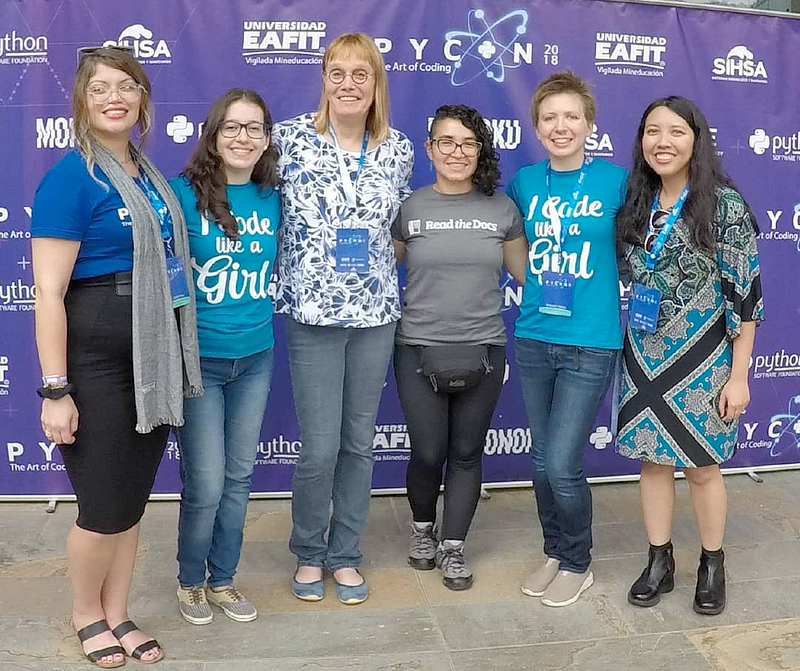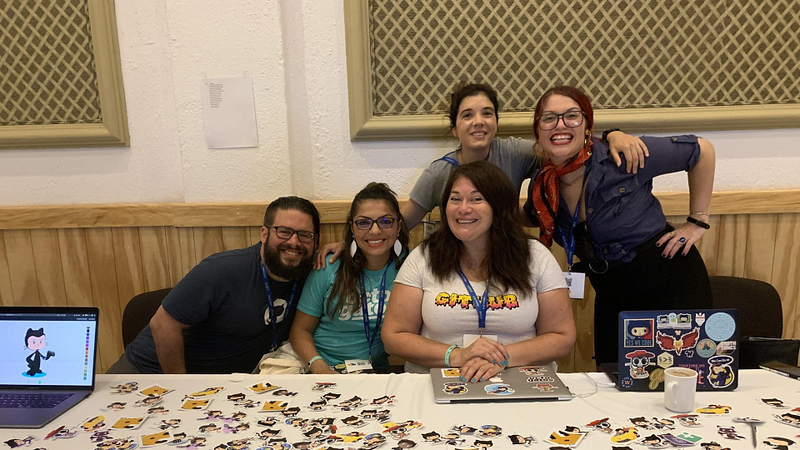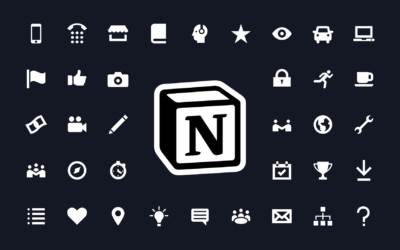This interview is part of our Diversity in Tech series in partnership with All Raise, Anitab.org, Blavity, Grid 110, and Latinas in Tech, a coalition effort to champion diverse representation in the tech industry. Read more about this initiative here, and download images from the Diversity in Tech collection here.
Political scientist turned coder, Lorena Mesa is a GitHub data engineer, Director & Chair of the Python Software Foundation, JOSS editor, and PyLadies Chicago co-organizer. Lorena’s time at Obama for America and her subsequent graduate research required her to learn how to transform messy, incomplete data into intelligible analysis on topics like predicting Latinx voter behavior. It’s this unique background in research and applied mathematics that drove Lorena to pursue a career in engineering and data science. One part activist, one part Star Wars fanatic, and another part Trekkie, Lorena abides by the motto to “live long and prosper.”
We caught up with Lorena to learn more about her work, where she sees the biggest opportunities to drive real change and support more equitable representation in tech, and her advice for those navigating the path to a future career in the industry.
Hi Lorena! Tell us about yourself, how did you get to where you are today?

Ironically I often tell folks I was doing data science before a Wikipedia page even existed for it! That is, my background is in applied social science research. As I graduated with a degree in political science from Northwestern University, I immediately began doing statistical analysis and other applied stats working on the Obama for America 2008 campaign specifically for the Latinx team.
That passion for working on social and civic causes that are near and dear to my heart is what ultimately propelled me to learn to code. I picked up Python working on the Obama for America campaign, continued working with it in my graduate research, and ultimately became involved in civic tech in Chicago. From there, I decided I loved coding and decided to pursue a career change as an engineer!
I think there are many paths to coding, and being “technical” includes a variety of skills. For me, my passion for justice, equity, and making the world a bit better than I found it before is what led me to apply my tech skills for good.
What was the catalyst that inspired you to pursue a career in technology and how did you make the transition from a political science background to coding?
As mentioned above, the movement from applied social science research to engineering is not a large one. I was using stats, coding skills, and communication skills to drive my research. Moving into civic tech, those skills were and still are very important. From civic tech and open source to obtaining my first engineering role as a data engineer at Sprout Social, I again drew from the same skills I employed in my work with open source.
That said, being a technologist particularly as an engineer, being inquisitive and open to failure, these are skills I learned well in my time working in politics and civic tech. It is precisely these skills that are important in my day to day work as a technologist.
What are some of the key values that drive the work you do and the organizations you support? How do these values inform the types of tech you create?
Empathy and communication are skills that are instrumental to any technologist, as is being an anti-racist. If you do not have empathy for your user, for the communities that your technology supports, or hold ideals that reify institutionalized racism, how can you meaningfully create?
Coming from a family of immigrants, as a Latinx queer person who is a first of many things, community and accountability to that community has always been important. However, in order to be accountable we have to show up to do the work. This is not done alone, but in tandem with others. We do the work by listening, having empathy, while also understanding that sometimes we may fail. All of this inspires me to want to contribute to those that have helped me along the way and is why I am motivated to contribute to Python open source and diversity and inclusion efforts in tech. These values — which I define clearly here — I publicly share whenever I speak with a potential employer, a potential collaborator, a potential open source project I will work on. If these values are not shared, I will not participate.

What are some of the greatest opportunities you see right now to drive meaningful change when it comes to more equitable representation in tech?
Sustained engagement is perhaps the biggest opportunity we have right now. We cannot simply invite marginalized folks into technology and presume that is enough. We have to intentionally create space and empower. How does this look? By defining opportunities where you can actually shift those within your sphere of influence — those who have the same lived experience as you. Likewise those outside our sphere of influence, those who harm has been rendered to, we must acknowledge the damage and find some form of accountability together to rectify the wrong.
With equitable representation in tech, this can take many forms. However I think holding technology companies accountable by defining goals publicly, making those goals part of the review of the highest level of leaders, and offering spaces for belonging for marginalized peoples are some of the strategies we can investigate. These spaces can be unions, they can be employee resource groups, but a true investment in these spaces and the people alongside public, tangible goals is the way we can move forward.
At Noun Project, we believe visual language has the power to shape, reinforce and change perceptions. What are your thoughts on why diverse visual representation in tech is so important to helping change the status quo in the industry?
Be the change you want to make is a motto I deeply believe in. We can all aspire to leave the tech industry a bit better than how it was when we arrived. In tackling issues that we are able to meaningfully contribute to, collectively we can shift power imbalances.
Having more people of color, or marginalized genders in tech is but a starting point. This is what we commonly refer to as diversity. Inclusion, the actual work we all need to do to show and and stay engaged, is when we create equity for others. To put it another way, “diversity is being invited to the party, inclusion is being asked to dance.” What this lens highlights then is not only how we can make space for others, but defer and empower others.
Looking to the future, what inspires you and what initiatives are you most excited about right now?
The next billion people coming online are not those from the United States of America or Europe, but those from Latin America, Africa, and Asia! I’m excited to see how peoples from these spaces can educate us about the power of technology and how to build technology better. One way I hope to continue to do this is by continuing to push for the development and usage of ethical codes in technology (e.g. Data for Democracy Oath). Additionally, empowering more marginalized peoples to becoming technologists.
How can people support the work you’re doing and actively support building a more inclusive and ethical tech industry?
First and foremost, we must all acknowledge that technology is not neutral. Technology is intrinsically biased — it is written by people, who are themselves subject to our own biases and limitations. Once we acknowledge this, we can continue to approach the ethical challenges head on rather than shy away. Of particular importance to me is listening to those who have different lived experiences than yourselves, such as those from marginalized communities.
We can do this in many ways including:
- Educating ourselves
- Approach a growth mindset to understanding the ethical challenges technology presents us
- Be willing to forgo a technological solution if the ethical challenges are too high
I’ve assembled a bias in tech reading list at biasin.tech where folks can begin their own journey of learning by reading. Additionally, it is hosted on GitHub and I welcome contributions to the list!
What advice would you give to young people navigating the path to a future career in tech?
Ask many questions. Embrace failure. Love the journey, not the destination. Technology tools and trends come and go, but one’s outlook and approach to learning as well as your values, that is what will make you who you are a technologist. Not everyone has the same path, that’s ok. In fact, I want and hope everyone has a different path, it makes tech that much more rich when we have a plethora of people in the space.

About Latinas in Tech
Latinas in Tech is a non-profit organization working to rebuild the tech industry so that Latinas are well-represented throughout all levels of the ecosystem. The group is comprised of more than 10,000 women, representing more than 23 countries, working at more than 200 of the top technology companies. The group began in Silicon Valley in 2014 and has since then expanded to 13 cities and states: Atlanta, Austin, Boston, Chicago, London, Los Angeles, Mexico City, Miami, New York City, Sacramento, Seattle, Utah, and Washington DC. Latinas in Tech focuses on 3 key pillars: professional development, recruiting, and mentorship. For more information, visit https://www.latinasintech.org.





